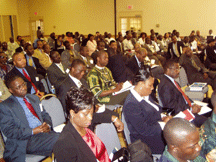
The All Liberia National Conference: A Grassroots Revolution
By Abdoulaye W. Dukulé
Adukule@theperspective.org
The Perspective
Atlanta, Georgia
April 22, 2005
 |
|
Courtesy of ULAA
|
“Peace fosters a relationship of respect, dignity and mutual benefit to all parties. Reconciliation deals with the restoration of peace between various parties…[…] …A process in which we can foster the fundamental belief that Liberia belongs to all of us.” Reverend A. Momolu Diggs, Speaking on Reconciliation at ALNC, April 15, 2005
The success or failure of conferences usually stems from three factors: the issues, the timing, and the audience. The recent All Liberia National Conference (ALNC) in Columbia, Maryland on April 14 – 16, 2005, was a major success on all accounts. From security to health care, from peace to political reform, every major problem confronting Liberia was discussed with the full participation of every attendant. Unlike conferences where pundits take the stage to render a diagnostic and then pontificate on professorial remedies, in Columbia, every one was given a chance to take part in discussions. The organizing committee randomly distributed folders of three colors – red, white and blue – during registration. The color represented the focus groups that met after a speaker had introduced a subject in plenary. The results compiled in the focus groups were then brought into the plenary for adoption.The timing of the conference could have been hardly better chosen. It coincided with the quarter of century anniversary of the two events that marked the descent of Liberia into the abyss: April 12 and April 14. The other coincidence was that the nation stands just a few months away from elections, the first since 1997 and most probably the first free and fair elections in the history of Liberia.
 |
|
Courtesy of ULAA
|
The Union of Liberian Associations in the Americas (ULAA) played a crucial role in the success of the conference. The team of Arthur K. Watson convened a meeting a few months ago to setup a steering committee. ULAA then stood in the background, never forcing any issue on the committee, while providing all the necessary support and logistics. Many members of ULAA were instrumental in various aspects of the conference but the umbrella organization remained a very discreet but helpful force. Members of the Liberian organizations in Europe, who also sent participants, took an effective part in the consultations leading to the meeting, with Mr. John Brownell President of Liberians in Europe and Vice-Chairman of the Steering Committee flying in.
“I have never seen so many Liberians in one place except for funerals of weddings,” said a participant who sat through the three days of meetings and networking.
Although none of the speakers mentioned the transitional government of Liberia – either to applaud it or criticize it - it was very noticeable that not a single person came from the embassy to greet the conference. The government was also absent at the conference organized by Dr. James T. Tarpeh. The excuse was that Liberians were divided and therefore government did not want to be party to squabbling. It is rather uncanny that a government of reconciliation would decide to stay away when hundreds of its citizens are meeting in foreign lands to talk about reconciliation, peace and governance at home… at least UN Jacques Klein was courteous enough to send a greeting message and an update on the current state of affairs in Liberia… “ The government missed a rare chance to make a pitch to its citizens, at a time when its reputation as a corrupt and inefficient administration seems to be the only news out of Monrovia.
In the end, the two conferences reached the same conclusions and the Steering Committee and have decided to work together in bringing the results of their work to the political battlefield in Monrovia.
The Next Step
Holding a successful conference is a minor accomplishment
in view of the tremendous task of translating the
recommendations into policy issues that the Liberian
people could embrace as theirs and that policymakers
could use as tools for the future development of Liberia.
Therefore, the real work just began.
The splendid achievement of the conference will turn into an exercise in futility if the great ideas developed could not be molded into palpable polices. The Steering Committee and ULAA must combine their efforts and look for ways to take these recommendations into the political arena. Would it be possible to organize a national conference in Liberia prior to elections? Short of such national forum, would it be possible to take few of the most urgent issues discussed at the conference and get them on the ballot? How can the ALNC and ULAA now start to work with those running for elected office to ensure that recommendations from the conference become campaign issues?
Further Down the Line…
Beyond organizing successful meetings and putting
forward constructive ideas on paper, Liberians in
the Diaspora have another daunting task ahead of them:
to ensure that after elections, the country does not
slip back, because of lack of qualified manpower,
investments and professionals, all things that were
on display at the Columbia conference.
Liberians may put up money to influence the course of elections at home and could play a major role in getting the best slates of candidates elected. They could send money to sustain friends and family members who toil daily to keep a bankrupt state functioning.
The surest way to develop Liberia will not be through remittances. The nation will spring out of this ill state of survival only if the middle class that has been in exile for decades resolves to return home and play a leading role in the reconstruction process. Those who stayed behind have made great sacrifices but the development of the nation would gain much from the direct input of those who have accumulated knowledge, wealth and experience while in the Diaspora.
